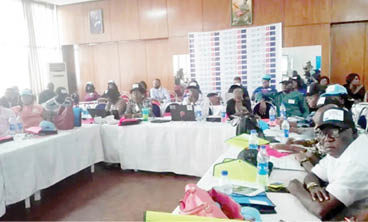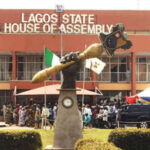The violence that characterised the just concluded general elections in the country did not spare journalists deployed by various media organisations to report on happenings at various polling and collation centres.
According to the Committee to Protect Journalists (CPJ), no fewer than 42 journalists were attacked, harassed, beaten and denied access, among incidents of assault on them while covering the elections.
The CPJ, in a report it released on March 23, said at least 14 journalists were attacked during the February 25 presidential and National Assembly elections while 28 were attacked during the March 18 governorship and state assembly elections.
The CPJ, a US independent non-profit, non-governmental organisation based in New York, has correspondents around the world, including Nigeria, to promote press freedom and defend the rights of journalists.
Residents decry water scarcity in Niger community
Zuba fruit sellers kick as FCT council suspends leaders
The report, compiled by a consortium of media experts and their Nigerian correspondents, gave a graphic description of the attacks across on the country.
Recorded attacks
On March 18, at least 10 unidentified men punched and used sticks to hit a TV crew with the privately owned Arise TV after they used a drone to film voting stations in Lagos State, according to a report by their outlet, a statement by the International Press Centre (IPC), a local media group, and one of the crew members, correspondent Oba Adeoye, who spoke with CPJ by phone.
They said security officers nearby did not intervene while the men attacked Adeoye, camera operator Opeyemi Adenihun, and driver Yusuf Hassan, but seized their drone after the incident.
Adenihun said he received medical treatment the next day for a cut to his face.
Lagos police spokesman, Benjamin Hundeyin, told CPJ by phone that police were investigating and that Adenihun was invited by the police on March 20 but said he did not appear.
Adenihun, however, said he did not hear from police since he reported the incident on March 18.
Also in Lagos, two officials from the Independent National Electoral Commission (INEC) prevented Chibuike Chukwu, a reporter with the privately owned news website, Independent, from taking pictures or videos at a polling place, according to a report by the outlet and a person familiar with the case who spoke on the condition of anonymity, citing fear of reprisal.
In the north central city of Lafia, the Nasarawa State capital, three state security officers slapped, punched, and used sticks to hit Edwin Philip, a reporter with private broadcaster Breeze 99.9 FM, on orders from a palace official at a PU, according to news reports and Philip, who spoke on the matter.
Philip said he was making inquiries about reports that the palace official had instructed some men to beat up a voter when the officers briefly seized his phone and began beating him.
Philip received stitches at a hospital for a deep cut to his head and reported the incident to the police the same day.
In Kano State, dozens of unidentified men accused Ashiru Umar, editor and senior correspondent with the privately owned Premier Radio, of filming them. They grabbed his phone, and stomped on it at a polling place in Galadanchi, a town in Kano, according to a report by the privately owned website Premium Times and Umar, who spoke on the matter.
The men beat Umar with their hands, sticks, and stones and attempted to stab him in the back with a knife.
He later filed a report with the police, but CPJ’s calls and text messages to Kano police spokesman Haruna Abdullahi did not receive any response.
In Abeokuta, the Ogun State capital, at least five unidentified individuals, including a masked man with an axe, chased not less than 10 journalists after noticing them filming a voting station, according to the IPC statement, a report, and two of those reporters, Adejoke Adeleye, a reporter with the privately owned outlet PM News, and Yusuf Adeleke, a reporter and editor with the privately owned news website Newsflagship.
A day after the March 18 election (on March 19), an official of INEC ordered four security officers to prevent Ayo Adenaiye, an Arise TV correspondent, James Akpa Oche, a campus reporter at Bayero University Kano, Stephen Enoch, a reporter with Plus TV Africa, and about three other journalists from various outlets from accessing a vote collation centre in the city of Kano.
According to a report by Premium Times, Adenaiye, Oche, Enoch, and another reporter who was there and spoke on the incident, requesting anonymity citing fear of reprisal, the officials had a list that excluded many journalists from entering the collation centre, Adenaiye said.
Prior the March 18 attack on journalists and other media practitioners covering this year’s elections, the CPJ said at least 14 journalists and media workers were detained, harassed, or attacked while covering the February 25 presidential and federal legislative elections, including private news website WikkiTimes owner Haruna Mohammed Salisu, who remains in police custody without charge.
Police detained Salisu on February 25 in Duguri town, southeastern Bauchi State, shortly after he and other reporters had met with the state governor, according to WikkiTimes editor Yakubu Mohammed.
Police said they took Salisu into custody to protect him after supporters of the governor attacked him as he interviewed local women protesting but then refused to release him, according to Mohammed, who visited him after he was transferred to police headquarters in Bauchi, the state capital.
In the FCT, Abuja, a group of men beat Dayo Aiyetan, executive director of the privately owned nonprofit International Centre for Investigative Reporting (ICIR), tore his clothes, and stole his phone and belongings after he filmed them disrupting voting at a polling site in the FCT.
Youths in Ibadan, Oyo State, attacked a vehicle from the state-owned News Agency Nigeria (NAN) for covering the elections, one of the crew members, Yinka Bode-Are, a camera operator, was traveling with a reporter and driver when the vehicle was set upon with sticks and dented.
In Agbor town, Delta State, a supporter of one of the main political parties, punched Bolanle Olabimtan, a reporter with the private news website TheCable, and knocked her over, while another seized her phone and deleted photos and video before returning it.
In Rivers State, police detained and threatened to shoot Gbenga Oloniniran, a reporter with the privately owned Punch newspaper, in Port Harcourt, then drove him across town and deleted photos from his phone before releasing him.
“Nigerian authorities should swiftly identify and hold accountable those responsible for the recent attacks, harassment, and intimidation of journalists covering state elections and ensure that members of the press feel safe to report on political issues,” said Angela Quintal, CPJ’s Africa programme coordinator, in New York.
Similarly, in its report on the elections, the International Press Institute (IPI) expressed concern at the attacks on journalists that were reported during the presidential, legislative and governorship elections.
The reports are from several local civil society organisations and international elections observation missions that monitored the February 25 and March 18 elections.
In a statement, IPI said following the February 25 elections, the International Press Center (IPC) of Nigeria, one of the leading local press freedom groups, released a report saying it had recorded 41 incidences of press freedom violations.
The incidents targeted more than 57 journalists and other media professionals. The recent report of IPC on the gubernatorial elections also highlighted overzealous political sympathisers, hoodlums and security forces as perpetrators of several incidents of assault on press freedom and journalists.
“At least seven journalists and media workers of three media houses, AIT, Arise TV News and News Agency of Nigeria were reportedly attacked in the March 18 elections in the federal city of Lagos, Ogun and Rivers states.
“The series of attacks, including denial of access and intimidation of journalists during the two sessions of elections, by both state security forces and political party supporters, are alarming and cast a further grim shadow on the press freedom situation in Nigeria,’’ the group said.
In an interview with IPI prior to the elections, IPI Nigeria National Committee Chair Musikilu Mojeed raised doubts about the concern of Nigerian politicians for the safety of journalists.
“The Nigerian government must investigate all violations and hold perpetrators accountable. Western embassies in Nigeria trying to punish election riggers with visa denials are encouraged to add abusers of journalists’ rights to their lists. They should be denied visas as well,’’ Mojeed said this week.
Also reacting to the report, IPI Deputy Director Scott Griffen said journalists and other media workers played a critical role in promoting access to information by the citizens which enables them to meaningfully participate in democratic processes.
“The attacks on journalists and media workers recorded during Nigeria’s elections underscore the need for more work to be done on press freedom to consolidate democracy in Africa’s most populous country.”
Speaking on the matter, the Chairman, Nigeria Union of Journalists (NUJ), Mr Emmanuel Ogbeche, said the over 80 attacks documented against journalists in the last elections are of grave concern and bring to fore the safety of journalists in the country and the need for robust response mechanisms in safeguarding free press in the country.
“It is worrisome that like in previous cases, nothing concrete will be done to bring to book all those responsible for the heinous attacks. No society can make democratic progress when its media and practitioners become targets of violence, harassment, intimidation and sometimes murder.
“The Nigerian government has a responsibility in ensuring conducive and safe environment for journalists to practice and it should demonstrate this by activating the relevant laws in this regard,” Ogbeche stated.

 Join Daily Trust WhatsApp Community For Quick Access To News and Happenings Around You.
Join Daily Trust WhatsApp Community For Quick Access To News and Happenings Around You.


